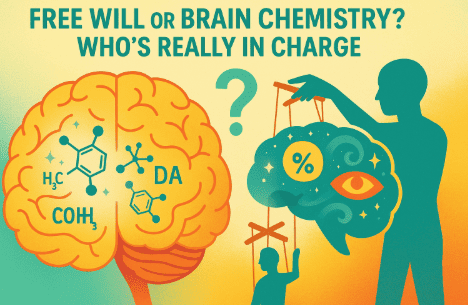
Recap of Lesson 4: Language and Thought – Can We Think Without Words?
In our last lesson, we discovered how language and thought are connected. We saw how brain areas like Broca’s area and Wernicke’s area make language possible, and how the Sapir–Whorf hypothesis suggests that language shapes how we see the world.
We also saw that babies, animals, and even adults can think without words, though language supercharges our ability to plan, reason, and imagine.
Now we turn to the question of choice. When you decide to pick chocolate ice cream instead of vanilla, was that really your decision, or was your brain already set on it before you even knew?
Part 1: What Is Free Will?
Free will is the idea that we have the power to choose our actions freely. It means we are not simply controlled by our biology, our environment, or fate.
When you choose to raise your hand, eat a cookie, or speak to a friend—you feel like you are in charge.
But science has started asking: Is this feeling an illusion?
Part 2: The Case for Free Will
Many philosophers, religious traditions, and ordinary people believe free will is real. The reasons are:
-
Personal experience: Every day, we feel like we are making choices.
-
Responsibility: If we don’t have free will, how can anyone be held accountable for their actions?
-
Creativity and planning: Humans imagine futures and select among them, suggesting freedom.
So from our inner perspective, it seems undeniable: I chose this.
Part 3: The Challenge from Neuroscience
Then along came science with some surprising discoveries.
The Libet Experiment
In the 1980s, scientist Benjamin Libet asked people to flex their wrist whenever they felt like it while looking at a clock. They reported the moment they “decided” to move.
Result: The brain activity (called the readiness potential) that prepared the movement started about 300 milliseconds before people reported their conscious decision.
This meant the brain had already begun preparing the action before the person felt like they decided.
Later Studies
Newer studies using brain scanners found that decisions could sometimes be predicted several seconds before the person was aware of them!
Does this mean free will is an illusion? Maybe. Or maybe our conscious mind doesn’t initiate choices but still gets to veto them.
Part 4: The Role of Brain Chemistry
Our decisions are also influenced by:
-
Neurotransmitters (brain chemicals like dopamine and serotonin). Dopamine boosts motivation and reward, serotonin affects mood and patience.
-
Hormones (like adrenaline, cortisol, testosterone, and oxytocin). These push us toward fight, flight, bonding, or risk-taking.
-
Genes – Studies show that certain genetic variations can make people more impulsive, cautious, or aggressive.
-
Environment – Stress, poverty, and trauma can strongly shape decision-making.
So while you may feel free, many invisible forces are pulling the strings.
Part 5: Philosophical Perspectives
Determinism
This is the idea that everything—including human choices—is fully determined by prior causes. Just like a line of falling dominoes, every event follows from previous ones. In this view, free will is an illusion.
Libertarian Free Will
Not political libertarianism—this means humans truly have the power to choose freely, independent of prior causes. We are not dominoes; we are agents.
Compatibilism
This is a middle ground. It says free will can exist even in a determined universe, as long as our actions come from our own desires and reasoning (even if those desires are shaped by biology).
For example: You “freely” choose chocolate ice cream if that’s what you want, even though your desire for chocolate has biological roots.
Part 6: Real-Life Questions
This debate is not just abstract—it affects real life.
-
Law: If free will is an illusion, should criminals be punished, or only rehabilitated?
-
Addiction: Is an addict choosing drugs, or is their brain hijacked by chemistry?
-
Mental illness: If depression pushes someone to act, is that their choice or the illness’s?
These questions show how much is at stake in understanding free will.
Part 7: A Possible Answer
Maybe free will is not all-or-nothing. Maybe:
-
At the unconscious level, the brain prepares many possibilities.
-
At the conscious level, we select among them, guiding our lives with reason and values.
So perhaps we are not “ghosts outside the machine,” but not just “machines” either. We are complex systems with both automatic processes and conscious guidance.
As neuroscientist Michael Gazzaniga put it: “We are responsible agents, even though we are biological machines.”
Recap
In this lesson, we learned:
-
Free will is the idea that we can choose freely.
-
Neuroscience challenges this by showing brain activity begins before conscious awareness.
-
Brain chemistry, genes, and environment strongly shape choices.
-
Philosophers debate determinism, libertarian free will, and compatibilism.
-
Real-life issues like law, addiction, and mental illness depend on how we understand free will.
-
A middle view is that the brain prepares options, but consciousness helps guide and veto choices.